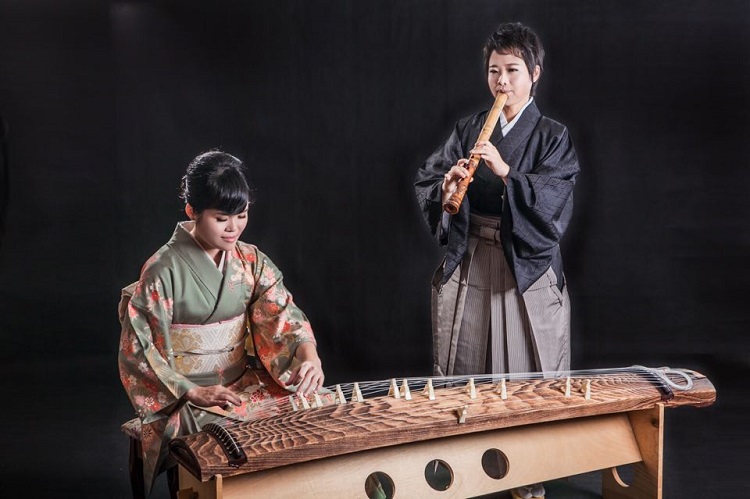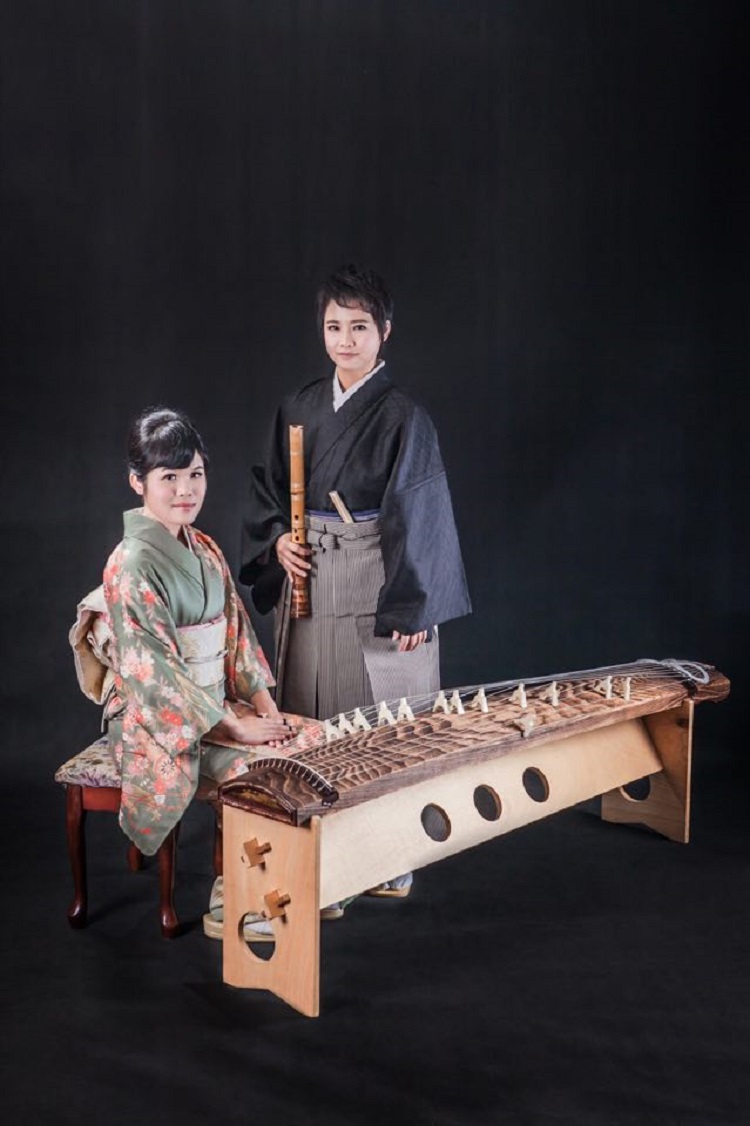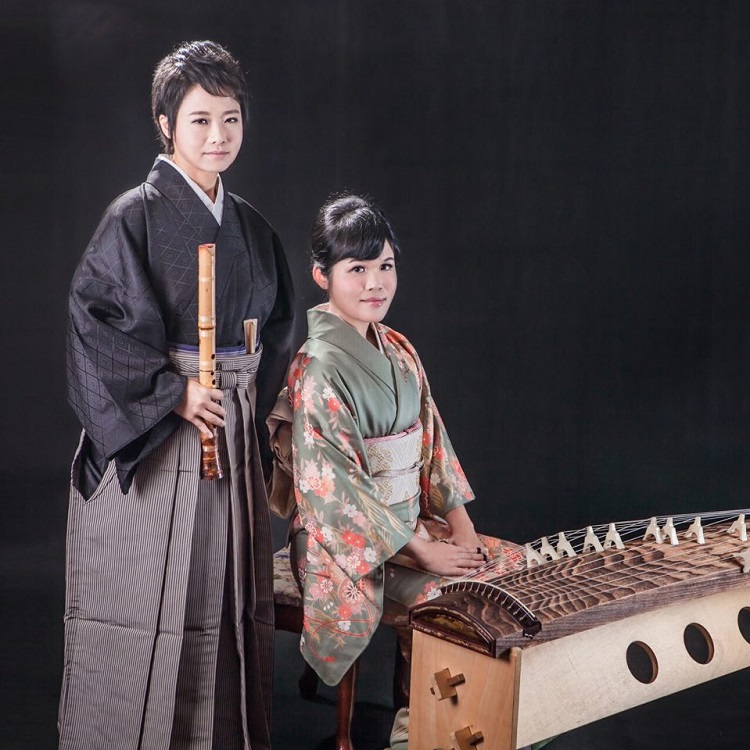Limmitationes, Udo Preis, 8382 Deutsch-Minihof 52, Austria | playup@aon.at | 0043(0)699 1080 9593
Eine fremdländische Musik; 2 großartige, international bekannte Musikerinnen aus TAIWAN, spielen JAPANISCHE Instrumente und bieten uns Lieder aus CHINA, Taiwan und Japan dar!!!!!! Ganz einfach!
JAPANISCH/TAIWANESISCHES DUO
Freitag 8. Juni 2018
Hauskonzert
8382 Deutsch-Minihof 52; Beginn 20:00 Uhr
Anreiseplan
Eintritt: 10,- | Mitglieder 8,- | Jugendliche: 6,-
Wir bereiten ein kleines Buffett (gegen freiwillige Spende)
die Musikerinnen:
| Su-Ping HSU | | zhen und koto |
| Ying-Jung LIU | | chinese flute, xiao, shakuhachi |
HÖRBEISPIELE:
|
|
|
|
 2 erfahrene Musikerinnen, Weltreisende geographisch aber auch Musikalisch. Eingeladen von weltbekannten Ensembles von Salzburg bis Tokio geben ein Konzert im Bambusgarten im Lafnitztal.
2 erfahrene Musikerinnen, Weltreisende geographisch aber auch Musikalisch. Eingeladen von weltbekannten Ensembles von Salzburg bis Tokio geben ein Konzert im Bambusgarten im Lafnitztal.
In meinem von wunderbaren Tönen/Melodien/Rhythmen erfüllten Leben erlebte ich selten diese Tiefe der Musik wie sie von Ying-Jung Liu praktiziert wird.
Ying-Jung Liu kommt aus Nantou, Taiwan. Sie hat Di-zi, die chinesische Bambusflöte, studiert und spielt auch andere chinesische Blasinstrumente. In den letzten Jahren hat sie sich auf die japanische Shakuhachi spezialisiert und studiert beim Shakuhachi-Meister Miyata Kouhachirou in Japan. Sie unterrichtet an der Tainan National University of the Arts.(krumusik)
Hana No Waon is a Japanese music ensemble based in Taiwan, composed of shakuhachi player Ying-Jung Liu and koto player Su-Ping Hsu. The name is given by Watanabe Haruko, the Great Teacher of Japanese Ikuta School. Hana means Flowers and Chinese, and Waon is an important concept in Japanese culture, meaning Harmony and Ensemble. Thus, Hana No Waon expresses the splendid duet like flowers, and besides Japanese music, they also perform Chinese music, making Hana No Waon a bi-musicality music ensemble
 YING-JUNG LIU from Nantou, Taiwan, finished her Bachelor degree from the Department of Chinese Music at the National Taiwan University of Arts and Master of Arts from the Graduate Institute of Ethnomusicology at the Tainan National University of the Arts. Majoring in the performance of Chinese Flute, Ms. Liu studied with many famous professors, teachers, and masters worldwide; she is now studying shakuhachi under the mentorship of the Japanese Shakuhachi master, Miyata Kouhachirou. In 2011, Ms Liu was qualified in the NHK Competition of Japanese Traditional Music to have her recording of Shika No Tohne broadcasted in Japan nationwide, which is a rare honor for foreign performers. In the same year, the recordingHaru No Umi, in which she worked with the Ensemble of Koto and Shakuhachi at the Tainan National University of the Arts, was nominated for the Best Interpretation of Traditional Music in the 22nd Golden Melody Awards. In recent years, Ms. Liu toured in Austria, Japan, and China, and her performance received favorable review. In 2013, Ms. Liu played Chan Ming Chi's Listening to the Wind's Singing: Concerto for Shakuhachi, Dizi, and Satsuma-Biwa with the famous conductor Yan Hui Chang and the National Chinese Orchestra Taiwan, and performed with the world- renowned shakuhachi performer John Kaizan Neptune. Being passionate for the art of traditional shakuhachi music, Me. Liu also devotes herself to modern music performance. She premiered Akokay by Austrian composer Wolfgang Liebhart and Zwischen Tanz und Gebet by Taiwanese composer Chia-Lin Pan, exploring the possibility of the combination of traditional and modern music. Ms. Liu is currently the chief director of Hana No Waon, a Japanese music ensemble based in Taiwan, lecturer of shakuhachi in the Department of Chinese Music at the Tainan National University of the Arts, and also gives shakuhachi lessons in the Institute of Asia-Pacific Music at the Tainan National University of the Arts and Taiwan Shakuhachi Society.
YING-JUNG LIU from Nantou, Taiwan, finished her Bachelor degree from the Department of Chinese Music at the National Taiwan University of Arts and Master of Arts from the Graduate Institute of Ethnomusicology at the Tainan National University of the Arts. Majoring in the performance of Chinese Flute, Ms. Liu studied with many famous professors, teachers, and masters worldwide; she is now studying shakuhachi under the mentorship of the Japanese Shakuhachi master, Miyata Kouhachirou. In 2011, Ms Liu was qualified in the NHK Competition of Japanese Traditional Music to have her recording of Shika No Tohne broadcasted in Japan nationwide, which is a rare honor for foreign performers. In the same year, the recordingHaru No Umi, in which she worked with the Ensemble of Koto and Shakuhachi at the Tainan National University of the Arts, was nominated for the Best Interpretation of Traditional Music in the 22nd Golden Melody Awards. In recent years, Ms. Liu toured in Austria, Japan, and China, and her performance received favorable review. In 2013, Ms. Liu played Chan Ming Chi's Listening to the Wind's Singing: Concerto for Shakuhachi, Dizi, and Satsuma-Biwa with the famous conductor Yan Hui Chang and the National Chinese Orchestra Taiwan, and performed with the world- renowned shakuhachi performer John Kaizan Neptune. Being passionate for the art of traditional shakuhachi music, Me. Liu also devotes herself to modern music performance. She premiered Akokay by Austrian composer Wolfgang Liebhart and Zwischen Tanz und Gebet by Taiwanese composer Chia-Lin Pan, exploring the possibility of the combination of traditional and modern music. Ms. Liu is currently the chief director of Hana No Waon, a Japanese music ensemble based in Taiwan, lecturer of shakuhachi in the Department of Chinese Music at the Tainan National University of the Arts, and also gives shakuhachi lessons in the Institute of Asia-Pacific Music at the Tainan National University of the Arts and Taiwan Shakuhachi Society.
 Su-Ping Hsu from Nantou, Taiwan finished her bachelor degree from the Department of Chinese Music, and Master of Arts from the Graduate Institute of Ethnomusicology at the Tainan National University of the Arts. Majoring in the Performance of Chinese Zheng, Ms. Hsu studied under Professor Te-Yuan Cheng, Professor Chun-Si Huang, and many famous Zheng performers and educators such as Pei-Hsuan Yang, Cheng-Yun Ding, Cui-Ying Liu, Wen-Ling Wang, and Sun Wenyan. Ms. Hsu began to studied Japanese koto with Professor Te-Yuan Cheng, and then studied under Watanabe Haruko, the Great Teacher of Japanese Ikuta School. Ms. Hsu learned Japan ese Music ensemble from Miyata Kohachiro, and since 2013 she studied koto with Nosaka Souju. During her sojourn in Japan from 2007 to 2009, she won the second prize in Yatsuhashi Kengyou competition in koto performance, and her performance was qualified to be broadcast in Japan nationwide. Ms. Hsu is the first Taiwanese koto performer to have such an honor, and had her recital in Kioi Hall, Tokyo. Since back to Taiwan, Ms. Hsu and shakuhachi performer Ying-Jung Liu formed Hana No Waon duet, and in 2010 the recording Haru No Umi, in which she worked with the Ensemble of Koto and Shakuhachi at the Tainan National University of the Arts, was nominated for the Best Interpretation of Traditional Music in the 22nd Golden Melody Awards.
Su-Ping Hsu from Nantou, Taiwan finished her bachelor degree from the Department of Chinese Music, and Master of Arts from the Graduate Institute of Ethnomusicology at the Tainan National University of the Arts. Majoring in the Performance of Chinese Zheng, Ms. Hsu studied under Professor Te-Yuan Cheng, Professor Chun-Si Huang, and many famous Zheng performers and educators such as Pei-Hsuan Yang, Cheng-Yun Ding, Cui-Ying Liu, Wen-Ling Wang, and Sun Wenyan. Ms. Hsu began to studied Japanese koto with Professor Te-Yuan Cheng, and then studied under Watanabe Haruko, the Great Teacher of Japanese Ikuta School. Ms. Hsu learned Japan ese Music ensemble from Miyata Kohachiro, and since 2013 she studied koto with Nosaka Souju. During her sojourn in Japan from 2007 to 2009, she won the second prize in Yatsuhashi Kengyou competition in koto performance, and her performance was qualified to be broadcast in Japan nationwide. Ms. Hsu is the first Taiwanese koto performer to have such an honor, and had her recital in Kioi Hall, Tokyo. Since back to Taiwan, Ms. Hsu and shakuhachi performer Ying-Jung Liu formed Hana No Waon duet, and in 2010 the recording Haru No Umi, in which she worked with the Ensemble of Koto and Shakuhachi at the Tainan National University of the Arts, was nominated for the Best Interpretation of Traditional Music in the 22nd Golden Melody Awards.
In recent years, Ms. Hsu was invited to perform koto and Chinese zheng in Japan, Hong Kong, China, and Taiwan, and also performs with Miyata Kohachiro, Kaoru Kakizakai, John Neptune, Mitsuhashi Kifu, Teruhisa Fukuda, Ichizan Hoshida, and Tam Po Shek. Also, in Taiwan, Shanghai, and Henan, Ms. Hsu has organized many lectures and recitals of koto and Chinese zheng, all to get a tremendous response. Ms. Hsu now teaches Chinese zheng and koto music in the Department of Chinese Music at the Tainan National University of the Arts, Chiayi Senior High School, Stella Matutina Girls' High School in Taichung, and the Taiwan Police College. And she is also the vice director of the Hana No Waon duet and zheng performer for the Taiwan Philharmonic Chinese Orchestra and Contemporary Artists Ensemble.
